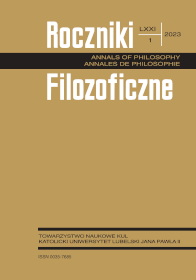WIELE TWARZY REPUBLIKANIZMU: WPROWADZENIE
THE MANY FACES OF REPUBLICANISM: AN INTRODUCTION
Author(s): Rafał Paweł WierzchosławskiSubject(s): Cultural history, Governance, Political history, Social history, Government/Political systems, EU-Approach / EU-Accession / EU-Development, Politics and Identity
Published by: Towarzystwo Naukowe KUL & Katolicki Uniwersytet Lubelski Jana Pawła II
Keywords: republicanism (versus liberalism); non-domination; mixed government; European historical identity; John Pocock; Quentin Skinner; Philip Pettit;
Summary/Abstract: The article consists of two parts. In the first part, I offer various understandings of modern republicanism and the republican tradition that we can find in the contemporary literature in question. At the same time, I point out that the term functions in different senses: the republican tradition can be studied by classical scholars (ancient Rome), historians of different countries (Italy, Holland, Poland or England), historians of law and governance systems (e.g., American founding myth). Republicanism can be an inspiration for contemporary philosophers who seek a conception of freedom as non-domination that is distinctive and competitive in relation to other traditions (liberal, communitarian) and seek structural forms of its implementation in the body politic (the[TS1] question of justice and legitimacy of the state). At the same time, reference to modern republicanism may perform certain rhetorical and argumentative functions (the so called ‘historical costume’), that is, by projecting certain values and social relations that would be derived from them, and connecting them to certain valued historical identities (e.g., a common European heritage or a national tradition). In the second part, I explain the reasons for a selection of the authors of the texts published in the second part of this issue, which is concerned with specific theorists. I point to their achievements and to the mutual permeation of the Polish and Transatlantic republican tradition in the texts devoted to the tradition of freedom of the Polish-Lithuanian Commonwealth (Gałkowski, Pietrzyk-Reeves, Grześkowiak-Krwawicz). The section on contemporary issues opens with a text by Philip Pettit to whose ideas, sometimes critically, refer to texts by the other authors (Lis, Grygieńć, CiżewskaMartyńska and Wierzchosławski).
Journal: Roczniki Filozoficzne
- Issue Year: 71/2023
- Issue No: 1
- Page Range: 7-47
- Page Count: 41
- Language: Polish

